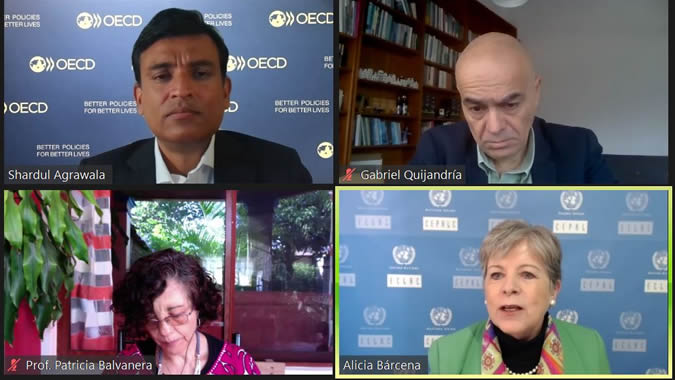Amid this Harsh Pandemic and During the Recovery, We Cannot Lose Sight of the Enormous Environmental Challenge: Alicia Bárcena
Work area(s)
ECLAC’s Executive Secretary called on countries to promote an Environmental Big Push in the wake of COVID-19, where the economy, employment and sustainability go together, during an event organized by the OECD.

“In these difficult times, we must be careful because environmental standards are being relaxed. We cannot afford this. We are facing a global public ‘bad’ – the COVID-19 pandemic – but the next one will be the climate crisis. We must build back better and that means doing so with equality and sustainability,” Alicia Bárcena, Executive Secretary of the Economic Commission for Latin America and the Caribbean (ECLAC), said today during a high-level virtual event organized by the Organization for Economic Cooperation and Development (OECD).
The senior United Nations official was one of the main panelists in the meeting entitled Building a Nature-Positive Economic Recovery, part of the Dialogue Series for a Green and Healthy Recovery organized by the OECD, in which participants discussed how to ensure that the post-pandemic economic recovery be nature-friendly and nature-positive.
The event was moderated by Shardul Agrawala, Head of the Environment and Economy Integration Division of the OECD Environment Directorate, and it included the participation of Teresa Ribera, Vice President of Spain and Minister for Ecological Transition and Demographic Challenge (via video). Participating as panelists along with Alicia Bárcena were Patricia Balvanera, Co-Chair of the Values Assessment of the Intergovernmental Science-Policy Platform on Biodiversity and Ecosystem Services (IPBES), and Gabriel Quijandría, Vice Minister of Strategic Development of Natural Resources at Peru’s Ministry of Environment.
During the event, Alicia Bárcena made a presentation on the climate emergency in Latin America and the Caribbean, based on the conclusions of her recent book entitled The climate emergency in Latin America and the Caribbean: The path ahead – resignation or action?, which was launched on June 18th of this year.
She recalled the region’s high degree of vulnerability to the impact of climate change. She explained that the estimated economic cost of this phenomenon, taking into account the main physical effects of a 2.5 ⁰C temperature rise, varies between 1% and 5% of regional Gross Domestic Product (GDP), and that 2,309 disasters struck the region between 1970 and 2019, causing more than 500,000 deaths and losses in excess of US$437 billion. She added that there are highly sensitive sectors, such as agriculture, along with water-related challenges, especially the prevalence of drought and its health effects as well as the high impact in coastal areas. She also indicated that biodiversity has been dramatically affected: the region has shown an 89% decrease in the abundance of species populations since 1970, which is the biggest loss in any biogeographical world area.
“We need an agroecological transition. Agriculture, forestry and fisheries are three very important sectors for finding nature-based solutions. That is why we are proposing an Environmental Big Push in which the economy, employment and sustainability go together,” ECLAC’s Executive Secretary stressed.
Bárcena added that it is necessary to move towards sectors that can drive structural change, such as non-conventional renewable energy, the circular economy and recycling, smart cities, sustainable and resilient infrastructure, less polluting consumption and the care economy.
She explained that technological innovation makes renewable energy more economical, despite the advantages still enjoyed by fossil fuel use. In addition, the generation of clean energy helps economic growth and job creation, she underscored.
“The Environmental Big Push that we are promoting is a way of restoring our economy. After the pandemic, countries want to grow and reopen at all costs, but this could lead to a reprimarization of economies. We must show them that investment can and should be made by seeking sustainable solutions. We have to think creatively. We are not going to be successful if we don’t make big investors understand that we want a different path, and that we can also analyze the cost-benefit together with the private sector,” Alicia Bárcena stated.
Related content
The climate emergency in Latin America and the Caribbean. The path ahead – resignation or action?
Presentation by ECLAC's Executive Secretary, Alicia Bárcena, in OECD meeting Building a Nature-Positive Economic Recovery.

To Confront the Climate Change Emergency and Rethink the Post-COVID Recovery, We Must Urgently Move Towards a New, More Sustainable and Egalitarian Development Pattern
ECLAC’s Executive Secretary, Alicia Bárcena, presented a new book today that exhaustively reviews the effects of climate change in the region and the policies addressing it.
Type
Country(ies)
- Latin America and the Caribbean
Related link(s)
Contact
Public Information Unit
- prensa@cepal.org
- (56 2) 2210 2040